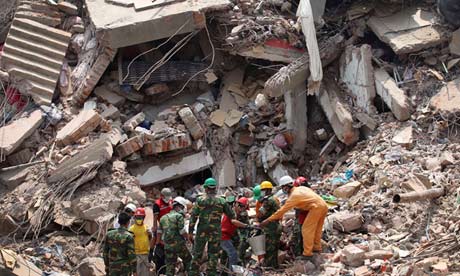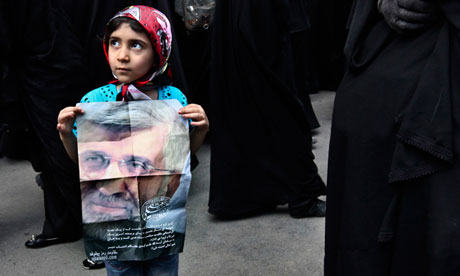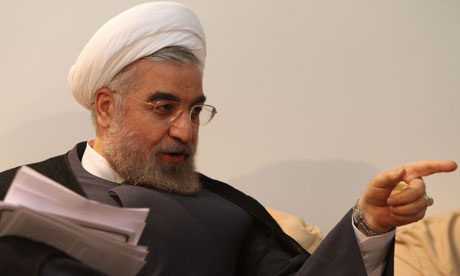Primark backs safety drive in wake of Bangladesh factory disaster
Retailer warns it may pull its clothing manufacturing operations out of Bangladesh if standards fail to improve

The rubble of
collapsed Rana Plaza garment factory building in Savar, near Dhaka,
Bangladesh, earlier this year. Photograph: Wong Maye-E/AP
Primark has warned that it could pull its clothes manufacturing operations out of Bangladesh if a safety drive fails to improve standards in the wake of the Rana Plaza disaster in April, which claimed 1,129 lives.
Primark is one of 50 brands, including Next and Zara, that have agreed to contribute up to $500,000 (£324,000) a year towards rigorous independent factory inspections and the installation of fire-safety measures under a five-year plan. The scheme will sit alongside the Bangladeshi government's new programme to improve safety.
"By signing up to the accord, we are all committing to at least maintaining the level of business we have in Bangladesh for five years. After that period, we will have to re-evaluate our position. We don't want to be in unsafe factories," said Katherine Kirk, Primark's ethical trading director.
Primark was one of around 40 brands producing clothes within Rana Plaza. The disaster highlighted the working conditions in Bangladesh's £13bn-a-year garment industry and the plight of millions of workers who are paid as little as £25 a month.
Rana Plaza was built on unstable ground using poor-quality materials, while two floors were added to a design that had been approved for six storeys only. Kirk said that Primark tried to safeguard the workers producing its clothing, but admitted that it had not carried out structural surveys of buildings. The firm keeps eight permanent staff in Bangladesh to monitor conditions in its factories, and works with local partners to train factory owners in safety. But Kirk said brands needed government support to ensure that safety laws were being enforced.
"When you look at the ethical audits that we are carrying out, the majority of what we are checking is that factories are meeting legal requirements. We would hope that governments are supporting an infrastructure that is monitoring those requirements as well," she said.
The Bangladeshi government has admitted it needs to recruit hundreds more factory inspectors. Just 51 inspectors issue factory operating licences in the country, which has more than 3,000 garment plants.
Primark is one of 50 brands, including Next and Zara, that have agreed to contribute up to $500,000 (£324,000) a year towards rigorous independent factory inspections and the installation of fire-safety measures under a five-year plan. The scheme will sit alongside the Bangladeshi government's new programme to improve safety.
"By signing up to the accord, we are all committing to at least maintaining the level of business we have in Bangladesh for five years. After that period, we will have to re-evaluate our position. We don't want to be in unsafe factories," said Katherine Kirk, Primark's ethical trading director.
Primark was one of around 40 brands producing clothes within Rana Plaza. The disaster highlighted the working conditions in Bangladesh's £13bn-a-year garment industry and the plight of millions of workers who are paid as little as £25 a month.
Rana Plaza was built on unstable ground using poor-quality materials, while two floors were added to a design that had been approved for six storeys only. Kirk said that Primark tried to safeguard the workers producing its clothing, but admitted that it had not carried out structural surveys of buildings. The firm keeps eight permanent staff in Bangladesh to monitor conditions in its factories, and works with local partners to train factory owners in safety. But Kirk said brands needed government support to ensure that safety laws were being enforced.
"When you look at the ethical audits that we are carrying out, the majority of what we are checking is that factories are meeting legal requirements. We would hope that governments are supporting an infrastructure that is monitoring those requirements as well," she said.
The Bangladeshi government has admitted it needs to recruit hundreds more factory inspectors. Just 51 inspectors issue factory operating licences in the country, which has more than 3,000 garment plants.















